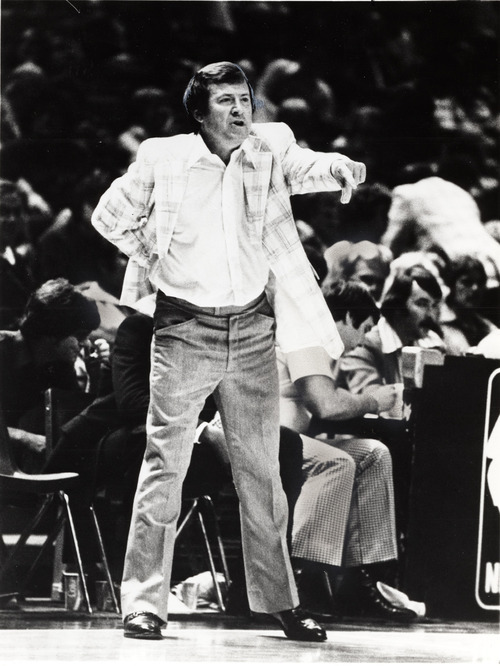This is an archived article that was published on sltrib.com in 2012, and information in the article may be outdated. It is provided only for personal research purposes and may not be reprinted.
Dick Motta is 0 for 2.
That won't get him into the Naismith Basketball Hall of Fame.
Each of the last two years, Motta has been a finalist for induction.
The Class of 2012 won't be officially announced until Monday but, as I've already reported, one of the great coaches in history has again been snubbed.
One of 12 finalists for the Hall of Fame this year, Motta failed to get the required 18 votes from the 24-member Honors Committee.
Nobody knows whether Motta came within one vote of making it or if he was shut out.
The Hall of Fame vote isn't made public.
Neither is the list of voters who last year decided Dennis Rodman was a worthy candidate and Motta was not.
The secrecy always raises the issue of voter responsibility, and the small number of electors make a dubious vote have too much impact in the final outcome.
The process needs an overhaul, starting with an authorized group like the Pro Basketball Writers of America doing the voting.
Such a move would lend credibility and responsibility to the process.
I mean, if 24 anonymous voters don't think Motta is worthy of the Hall of Fame, I question their credibility.
On the other hand, if 240 voters are willing to make their ballots public and shun Motta, maybe I need to step back and see what I'm missing.
In this case, however, I believe I'm right.
Motta is a Hall of Famer in every sense — on the court, off the court, in the record books and in the eyes of those who watched him coach (and mostly win) at every level for 40 years.
Although he could be a post-game grump with reporters — one possible reason he isn't already in the Hall of Fame — his influence on a generation of top coaches including Jerry Sloan, Phil Johnson, Bobby Weiss and Wes Unseld is unmistakable.
Motta was born in Midvale, attended Utah State and won his first title in 1959, when he guided little Grace High School to an Idaho state championship.
Motta was the first coach of the Chicago Bulls, who made the playoffs in their expansion season and won 51 games in their third year.
With players like Norm Van Lier, Chet Walker, Bob Love and Sloan, Motta made NBA basketball a success where it had previously failed and built the launching pad for Phil Jackson and Michael Jordan.
Motta won a championship with the Washington Bullets in 1978 and built another expansion team, Dallas, into a contender in the 1980s.
If Motta had quit at that point, he'd probably already be in the Hall of Fame.
But he kept coaching, trying to build teams in Sacramento and Denver like he had in Chicago, Washington and Dallas.
Motta's record in Sacramento was 48-113.
He was 17-52 in Denver.
His won-loss record dropped to 880-849 to 950-1,017.
Most of those who don't think Motta is a Hall of Famer ignore the fact only 10 coaches have won more NBA games.
Instead, they point to his overall winning percentage and suggest it somehow detracts from his legacy.
Those people don't know Motta's story and they certainly shouldn't be deciding if he's a Hall of Famer.
Steve Luhm covers the NBA for The Salt Lake Tribune. Around the NBA
—
Jimmer must be more vocal
• Golden State coach Keith Smart says Isaiah Thomas gets more minutes than Jimmer Fredette partly because of his leadership ability. Thomas is more demanding of his teammates, Smart explained, while Fredette must learn to "sometimes step out of his personality. Sometimes you can be a quiet guy and just play your game. But sometimes you have to be a more vocal — a little more demanding of others."
Big men 'punished' by 3-point emphasis
• Denver coach George Karl believes low-post players in today's NBA have been "punished" by the emphasis placed on the 3-point shot. "It's harder for them to get the ball," Karl said. "It's harder for them to define their roles, especially the young ones. They come out of college, where they touch the ball all the time [and] are the centerpiece of offense. But, in pro ball, it just doesn't go into the big guys any more." — Steve Luhm



